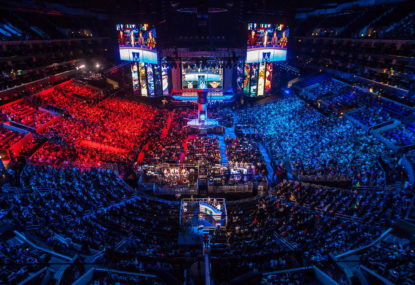The World Cup has been great, but it has reminded me of one thing above all else: esports commentators are, on average, better than their peers in traditional sports.
It’s not just football, by the way. As a Yorkshireman growing up around the turn of the century, a lot of my teenage memories involve the incomparable commentating duo of Eddie [Hemmings] and Mike ‘Stevo’ Stephenson.
I say incomparable because I have yet to hear anything so awful since then. Super League has come a long way since its inception, and Steveo’s retirement marked one of its finest moments. Eddie still remains, but is far more tolerable without his quirky sidekick.
If you have never had the dubious pleasure of hearing Stevo commentate – first of all, congratulations – it is probably fair to call him the John Madden of rugby league.
He was mostly there to act silly, state the obvious, and get excited about exciting things. If you were being generous you might call him bubbly and eccentric; if not, you’d probably say he was obnoxious and irritating.
But this is the esports section of The Roar, why am I talking about rugby commentators?
Because esports fans should count themselves very fortunate for the broadcast talent they currently enjoy.
When it comes to being knowledgeable about their chosen subjects, esports commentators leave their traditional counterparts in the dust. Just listen to HenryG talk about the pros and cons of a risky force buy and you will hear more wisdom in a few seconds than Stevo offered rugby fans in an entire career.
Now, I don’t know if this is the same down there in the colonies, but in Britain, broadcasters have an awful habit of simply hiring the first ex-pro to put their name forward. Sometimes this pays off: I can’t imagine BBC football without Gary Lineker, for example.
Often, though, it doesn’t. Stevo is just one example, but the airwaves are rife with former players offering zero insight. Worse still, most of them have the personality and likeability of beige wallpaper.
How Phil Neville got a prime spot on the BBC’s World Cup coverage this year is beyond me. I can only assume they didn’t want to be the only coverage team without a Neville brother.
The logic behind hiring retired pros in the first place is somewhat sound in theory, if not in practice. It’s all about marketing, of course. Alan Shearer might be an insipid boor, but as an ex-England international of considerable standing, you can see why it might once have seemed like a good idea to hire him.
It must work to a degree, too, because companies keep on doing it.
Fortunately, in esports, we don’t have to suffer such drivel. It begs the question: what is so special about our fledgeling sport? How do we largely avoid the trap of just hiring retired pros with nothing to say?
Let’s be clear here, by the way: esports broadcasts do feature plenty of ex-pros, too, it’s just that they almost always seem to be quite good at their new job. Hell, Spunj is a better analyst than he ever was at playing the game, and I don’t mean that as an insult.
Perhaps it’s something to do with the cerebral nature of esports. So much of professional gaming is about mental acuity. You need reflexes, sure but, above all, you need to play smart.
Clearly, there is no link between being a professional sportsman and being a professional sportscaster, but perhaps there is a link between playing a game about intelligence and being able to speak intelligently about said game.
Not that there aren’t smart footballers, but footballers are specialist. A great striker can tell you all about scoring goals, but a great Counter-Strike player can tell you in-depth information about every aspect of the game.
There is also something to be said for the fact that our sport is so young. There simply aren’t a ton of retired pros hanging around for a commentary job in the first place. That leaves the door open for professional commentators – people for whom speaking eruditely is a primary skill, not a mere bonus.
Sadokist, despite recent controversy, is the best example here. As far as I know, he isn’t even particularly good at Counter-Strike. It doesn’t matter.
You don’t need mechanical in-game skills to be able to talk about people who do. He also happens to be paired with one of the co-commentators who absolutely does understand the game on a higher level, which helps.
Esports isn’t beholden unto the received wisdom of traditional sports. We can learn a lot from the way they do things, of course, but we can improve on their mistakes as well.
ESL don’t need to hire Heaton or Spawn when they can get Bardolph and DDK. Maybe that will change as esports matures and big names from the past become properly big names, but I hope it doesn’t.
And if it does, let’s enjoy what we have while we have it.





























































































